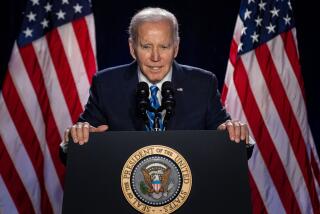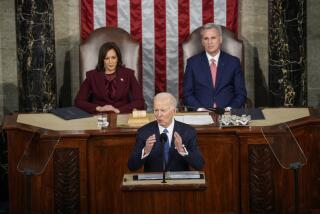On Day 100, a determined Obama
- Share via
WASHINGTON — A somber President Obama warned a recession-weary nation Wednesday that its resilience would be tested even more in the second hundred days of his presidency, as he grapples with a series of crises including two wars, a teetering economy and an outbreak of swine flu.
On the 100th day of his administration, Obama used a prime-time news conference to appeal for patience from Americans who have given him high approval ratings, laying out in unsparing detail the full scope of what the country faces.
The typical president, he said, “has two or three big problems. We’ve got seven or eight big problems. And so we’ve had to move very quickly.”
At times Obama sounded almost wistful as he suggested that some past presidents had only a war or a natural disaster to contend with.
“If you could tell me right now when I walked into this office . . . that all you had to worry about was Iraq, Afghanistan, North Korea, getting healthcare passed, figuring out how to deal with energy independence, deal with Iran and a pandemic flu, I would take that deal,” he said. “I would love a nice, lean portfolio to deal with, but that’s not the hand that’s been dealt us.”
Underscoring the severity of the domestic problems, Wednesday began with a sober reminder of the recession’s depth: The U.S. economy shrank at a rate of 6.1% in the quarter that ended last month.
Given so many serious problems demanding such urgent action, Obama said, improvement would not come quickly.
“The ship of state is an ocean liner; it’s not a speedboat,” the president said. “If we can move this big battleship a few degrees in a different direction, we may not see all the consequences of that change a week from now or three months from now, but 10 years from now, or 20 years from now.”
Though much of Obama’s news conference focused on domestic problems and politics, some of his most sobering comments involved Pakistan, the rising threat posed there by the Taliban and the challenge of keeping Islamabad’s nuclear weapons secure.
Describing the Pakistani regime as “extremely fragile,” Obama said its military leaders and government officials only belatedly were recognizing that their half-century-long preoccupation with India had blinded them to the more immediate threat posed by the Taliban.
“You’re starting to see some recognition just in the last few days that the obsession with India as the mortal threat to Pakistan has been misguided, and that their biggest threat right now comes internally,” he said.
This week, Pakistan’s military began a significant counter-attack against the Taliban, which has moved within 60 miles of Islamabad.
U.S. officials have been critical of the Pakistani government in the past, but Obama went further. Most critiques have focused on Islamabad’s failure to provide services or combat insurgents in the border areas. Obama’s criticism was sharper, pointing up failures that he said extended throughout the country.
The Pakistani government’s hold on power was weak, he said, because it could not provide basic services to its people -- including education, healthcare and a widely accepted system of law and judicial administration.
“And so as a consequence, it is very difficult for them to gain the support and the loyalty of their people,” Obama said.
Nonetheless, the president expressed confidence that Islamabad’s nuclear weapons would not fall into Taliban or terrorist hands.
“I’m confident that we can make sure that Pakistan’s nuclear arsenal is secure,” he said, “because the Pakistani army, I think, recognizes the hazards of those weapons falling into the wrong hands.”
Discussing the swine flu crisis, Obama rejected the idea of closing the border with Mexico, where the outbreak is most severe and is thought to have originated, because he said public health officials said border closures had not proved effective in the past.
“It would be akin to closing the barn door after the horses are out,” the president said. Tacitly appealing for calm, he said: “We have to make sure that we recognize that how we respond -- intelligently, systematically, based on science and what public health officials have to say -- will determine in large part what happens.”
At times sounding more like school nurse in chief than commander in chief, Obama repeatedly urged people to inhibit the spread of the flu by washing their hands frequently, covering their mouths when coughing, and staying home if they feel sick to avoid the possibility of exposing others.
With so many pressing priorities, Obama said, some goals may be delayed. He has pledged to overhaul the nation’s immigration system. But he sounded a note of caution about how quickly a plan could be enacted, committing himself only to beginning the process this year.
“I’m going to be moving it as quickly as I can,” he said. “I’ve been accused of doing too much. We are moving full steam ahead on all fronts.” He noted, however, that he did not control the legislative calendar on Capitol Hill.
Taking a question about Pennsylvania Sen. Arlen Specter’s surprise announcement Tuesday that he was leaving the GOP for the Democratic Party, Obama offered Republicans an overture and a warning. He said that he wants to work cooperatively with the minority party, and believes that he can.
But he also said that the GOP must be willing to compromise and perhaps rethink long-held nostrums. Obama said that if Republicans believe that bipartisanship amounts to him agreeing to “go along with ideas that have been rejected by the Americans in an historic election, we’re probably not going to make progress.”
With violence rising in Iraq in recent weeks, the president stood by his plan to draw down American troops. He said that although there had been some “spectacular bombings,” civilian deaths and incidents were low in relation to what was going on last year.
Obama said he was confident his military team in Iraq would work with Iraqi officials “to create the conditions for an ultimate transfer after the national elections,” which are scheduled in December.
The 100th-day stock-taking was a benchmark the administration embraced only after some initial hesitation.
White House aides had dismissed the date as a “Hallmark holiday.” But with the media so focused on the calendar, aides wound up cooperating to the fullest.
The White House released intimate photos of the president and his family, made aides available for TV interviews and circulated written summaries of Obama’s record. And his opening remarks included a catalog of what he considers his administration’s achievements thus far.
Earlier in the day, the president marked the occasion with a campaign-style event near St. Louis. Both there and in his news conference, Obama delivered much the same message: He has put the nation on a better path, although the kind of economic recovery he has promised may be years away.
National polls show that his approval rating tops 60%, and that growing numbers of people believe the country is on the right track since he took office.
In his opening remarks in the East Room of the White House, Obama said: “We have plenty of work left to do. It is work that will take time. It will take effort. But the United States of America will see a better day.”
Americans, he said, “can expect an unrelenting, unyielding effort from this administration to strengthen our prosperity and our security -- in the second hundred days, and the third hundred days, and all the days after.”
--
Julian E. Barnes and Noam N. Levey in the Washington bureau contributed to this report.
More to Read
Get the L.A. Times Politics newsletter
Deeply reported insights into legislation, politics and policy from Sacramento, Washington and beyond. In your inbox three times per week.
You may occasionally receive promotional content from the Los Angeles Times.











